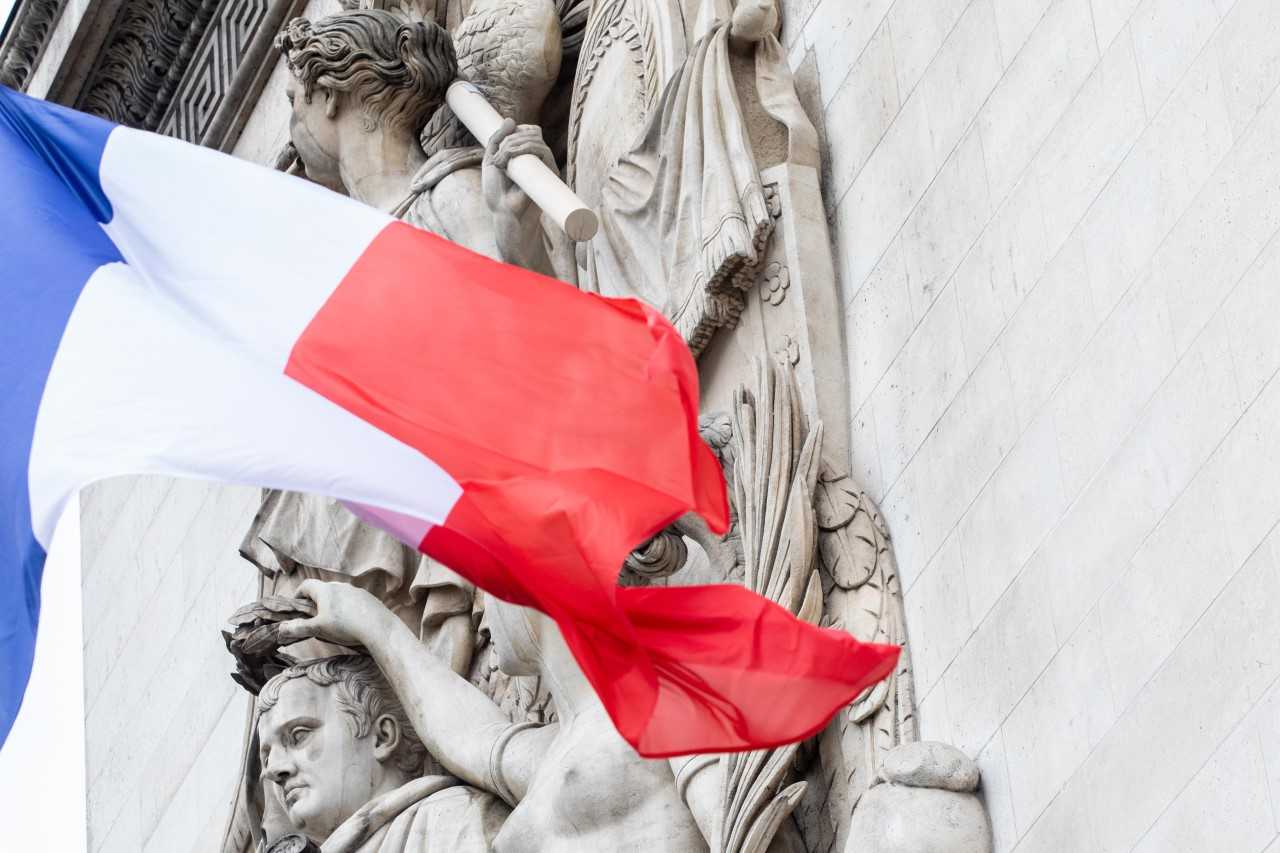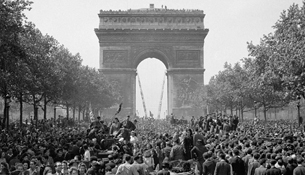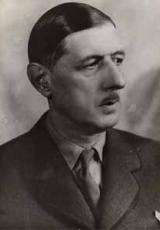National commemorative day of 8 May 1945

Relive the VE Day ceremony of 8 May 2020
Video - Source : www.elysee.fr
*
Message
At the VE Day ceremony
of 8 May 1945
This 8th May does not feel like VE Day.
There is no festive mood.
Today, we cannot gather in large numbers before the memorials in our towns and cities, in our village squares, to remember our history together.
In spite of everything, the Nation comes together through our thoughts and the many links our shared memory weaves between us, this fabric of peoples, which we hold aloft on this day in a silent tribute.
This year, it is in the privacy of our homes, our balconies and windows decorated with flags and bunting, that we call up the glorious memory of those who risked their lives to defeat the curse of Nazism and reconquer our freedom.
That was 75 years ago.
Thanks to them, our continent closed the darkest chapter in its history: five years of horror, pain and terror.
For our country, that conflict began in September 1939.
In the spring of 1940, 80 years ago, the enemy wave surged across the northeastern borders and the barrier of our army could not withstand it.
Our troops nevertheless distinguished themselves on numerous occasions. At Montcornet, Abbeville, Gembloux and Stone; the men of Narvik, the Cadets of Saumur, the Army of the Alps, all vigorously defended our territory and our flag.
They are “the men of 1940”. Their courage must not be forgotten.
In the twilight of that “strange defeat”, they lit torches. Their radiance was a profession of faith which, in the midst of collapse, allowed the promise of 8 May 1945 to shine through.
That new dawn went on to be hard fought and hard won by the fighting of the French and Allied armies, by the Free French, who never gave up the struggle, by the devotion and sacrifice of the French Resistance, by each and every French man and woman who refused to accept the humiliation of our nation and the corruption of our ideals.
Because of their combined courage, General de Gaulle represented France at the victors’ table.
Preserving our dignity, overcoming adversity, winning back our freedom and restoring our happiness: we owe these things to all those soldiers and members of the Resistance.
To those heroes, the Nation expresses its unwavering and everlasting gratitude.
On 8 May 1945, people were overcome with joy. Flags flew from the windows, but so many men had died, so many lives were broken, so many towns and cities in ruins. Jubilation was followed by sorrow and desolation. With the return of the deportees, people soon discovered Nazi barbarity in all its horror.
Nothing would ever be the same again.
The fragility of our lives and our civilisations made them all the more precious. Emerging from that long night, humanity had to hold its head up once more. It had just discovered with horror that it was capable of annihilating itself, and it now had to rebuild the world, from top to bottom, or at least “prevent the world from destroying itself”, in the words of Albert Camus.
It was time, in France, for national unity, to inaugurate “the good times” announced by the National Council of the Resistance and which were soon upon them.
Time, in Europe, for a joint effort to build a peaceful, fraternal continent.
Time, throughout the world, to build the United Nations and multilateralism.
Today, of course, we commemorate the Victory of 8 May 1945, but also, and above all, the peace that followed.
That was the greatest Victory of 8 May. Our finest triumph.
Our common fight, 75 years on.
Long live the Republic!
Long live France!
Emmanuel Macron
*

Due to the health crisis, the official ceremonies of the 75th anniversary of VE Day were unable to go ahead as normal.

8 May 1945, ©ECPAD
History
The German surrender
On 7 May 1945, the act of surrender of the German armies was signed in Reims, by General Bedell Smith on behalf of the Supreme Commander of the Allied Expeditionary Force; General Sousloparov on behalf of the Soviet Union; General Sevez on behalf of France, and General Jodl on behalf of the German High Command. On 8 May, at 3 pm, the bells of all the churches officially pealed to mark the end of the war while General de Gaulle announced the news on radio: “The war has been won. This is victory. It is the victory of the United Nations and that of France.” The afternoon of 8 May and all of 9 May were declared special holidays. Crowds took to the streets chanting the Marseillaise and other patriotic songs. However, the date of 8 May does not mark the end of German military presence on French territory. The last pockets of resistance – Dunkerque, Lorient, Saint-Nazaire – only fell on the days following the surrender of the Reich. Above all, the victory was unable to eradicate the memories of the atrocities committed by Nazi Germany, nor the years during which the population was confronted with choices that divided the nation.
The importance of remembrance
8 May, 1945 to the present day: from victory celebration to national public holiday
In 1945, General de Gaulle preferred to unite the French people around major patriotic celebrations such as the commemoration of 16 May (St Joan of Arc’s Day) or 11 November, to insist on the inextricable link between the two world wars. Like the communists, de Gaulle felt it was only right to celebrate a single victory. Thus, until the mid-1950s, the commemorations held in honour of the First World War were the most important.
Gradually, the question was raised as to whether a single day of commemoration should be established or whether the two dates should be remembered separately, but with the same degree of solemnity.
1946: Sunday 8 May (or the following Sunday) is established by law as the date to commemorate the victory
Law no. 46-934 of 7 May 1946, adopted by the constituent assembly under the provisional government presided over by Félix Gouin, set down the principle of commemorating the victory and set the date.
“Sole Article: The commemoration of the victory won by the French and Allied armies on 8 May 1945 shall be celebrated on the 8th of May of each year if this day is a Sunday and, if not, the first Sunday following this date.”
The 8th of May joined the ranks of the other days of commemoration such as 18 June (the anniversary of the appeal by General de Gaulle in London), the Liberation of Paris, and, most importantly, 11 November, that united the population together around national events.
However, the commemoration of the victory, pushed back to the following Sunday when 8 May did not fall on a Sunday, was immediately caught up in St Joan of Arc’s day, commemorated on the same day. So, from 1947 onwards, the various associations of Resistance fighters and deportees made known their wish to celebrate the victory on its anniversary and organised their ceremony on this date.
1953: 8 May becomes a public holiday
By law no. 53-225 of 20 March 1953, originating in a parliamentary motion, 8 May was made a public holiday. Accordingly, it became the symbolic date of the Second World War in the same way 11 November symbolised the First World War.
This hard-won general consensus was nevertheless compromised by a series of events, such as it coinciding with the disaster of the Battle of Diên Biên Phu in 1954, the division engendered by the Algerian War from 1955 onwards, in particular the demonstrations of 13th May 1958 led by the French in Algeria demanding General de Gaulle’s reinstatement.
1959: the second Sunday in May is established by law to celebrate the victory
To reduce the number of public holidays in May, decree no. 59-533 of 11 April 1959, reviving the spirit of the law of 1946, stipulated that the victory of 1945 would be celebrated the second Sunday in May. This decision incited a great deal of protest among the veterans who continued to commemorate the victory on 8 May. The majority of them refused to attend the official ceremonies.
1965: 8 May is exceptionally made a public holiday in honour of the victory’s 20th anniversary
By special dispensation, for the 20th anniversary, 8 May 1965 was exceptionally declared a public holiday following the decree of 1 April 1965.
Up to 1981: new debates are held on how to celebrate the victory of 8 May 1945
To satisfy the veterans who wished to see the victory celebrated on its anniversary without increasing the number of public holidays in May, a decree of 17 January 1968 set forth an annual celebration once again to be held on 8 May, but at the end of the day.
In 1975, the President of the Republic in office, Valéry Giscard d’Estaing, made the decision to remove the governmental aspect of the ceremony and withdrew the official and national commemoration. He proposed substituting it with a European Day while the government considered making 11 November a national day of remembrance. Spurred on by the desire for a Franco-German reconciliation, this decision was taken within a European context. It nevertheless aroused lively reactions and protests both in the political world and among the war veterans who for many years had campaigned to have 8 May commemorated in the same degree as 11 November.
So, up until 1981, a large number of towns and villages continued to officially celebrate 8 May on its anniversary.
Since 1981: 8 May is declared a public holiday and then a national holiday
Following amendments to the French Labour Code, law no. 81-893 of 2 October 1981 added 8 May to its list of public holidays.
In 1982, after much debate, the day of commemoration was recognised as a national holiday. This public and national “day of liberty" was widely presented in schools and universities and the ensuing commemorations received a great deal of media coverage.
Despite its slow development, riddled with obstacles, the 8 May remained a symbolic date, celebrated by nearly every town and village. A national day of remembrance, it gradually became a second 11 November, from which it borrowed a large part of its rituals. On this day, all of the events of the Second World War are commemorated: both the Allied victory and the end of Nazi oppression in Europe. Today, unity is built around a message to be passed on: the fight for liberty and democracy.


